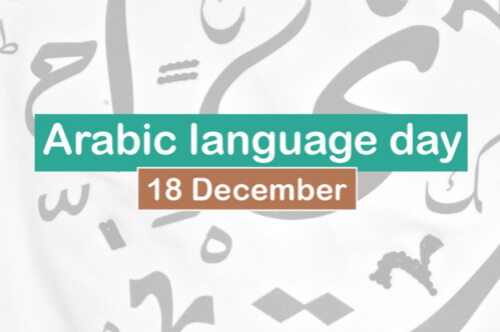
Message from Ms. Audrey Azoulay, Director-General of UNESCO, on the Occasion of World Arabic Language Day文章源自英文巴士-https://www.en84.com/8495.html
教科文组织总干事奥德蕾·阿祖莱世界阿拉伯文日致辞文章源自英文巴士-https://www.en84.com/8495.html
文章源自英文巴士-https://www.en84.com/8495.html
18 December 2019文章源自英文巴士-https://www.en84.com/8495.html
2019年12月18日文章源自英文巴士-https://www.en84.com/8495.html
文章源自英文巴士-https://www.en84.com/8495.html
On this World Arabic Language Day, we celebrate a powerful symbol of the identity of more than 400 million people around the world. We also celebrate a brilliant scientific and cultural heritage transmitted and forged in the Arabic language – the language of scholars such as Avicenna or Albucasis, the language of scientific and technological innovation par excellence.文章源自英文巴士-https://www.en84.com/8495.html
文章源自英文巴士-https://www.en84.com/8495.html
值此世界阿拉伯文日,让我们礼赞作为世界上4亿多人强有力身份象征的阿拉伯文,也让我们礼赞通过这一语言传播和锻造的那份璀璨的文化和科学遗产。阿拉伯文是阿维森纳和阿布卡色斯这些大学者的语言,也是非常适于科学和技术创新的语言。文章源自英文巴士-https://www.en84.com/8495.html
文章源自英文巴士-https://www.en84.com/8495.html
At the beginning of the twenty-first century, humanity is also going through a period of major technological innovation. Artificial intelligence, the theme of this year's celebration, opens new horizons and reveals the scope of possibilities; it represents a technological, scientific and economic revolution, but also marks an anthropologically disruptive turning point, raising unprecedented ethical dilemmas.
二十一世纪初的今天,人类正跨入一个重大技术革新的时代。今年世界阿拉伯文日以人工智能为主题,而人工智能尤其开辟了新的视野,揭示了各种可能性领域。它代表了一场技术、科学和经济革命,同时也代表一场人类学冲击,带来了前所未有的伦理困境。
The development of artificial intelligence will have many repercussions, including in the areas of multilingualism and cultural diversity. Such disruption is indeed a major challenge, particularly when it comes to preventing access to new technologies from being conceivable only in a limited number of languages. In order to preserve the cultural diversity that gives humanity its richness, it is important to ensure that artificial intelligence is an inclusive technology, including linguistically, so that technological barriers are not reinforced by language barriers.
人工智能的发展将产生许多影响,包括在多语言使用和文化多样性领域。这样的冲击确实是一个重大挑战,特别需要防止出现只有少数几种语言才能获得新技术的局面。因此,为了保护人类丰富的文化多样性,必须确保人工智能成为一项具有包容性(包括语言包容性)的技术,而不是在技术障碍之外又新添语言障碍。
While it poses its share of threats to multilingualism, artificial intelligence is also a formidable source of opportunities and promise. With the development of instantaneous translation tools, it could facilitate dialogue between peoples and cultures. With improved and personalized teaching, it could also greatly facilitate the learning of several languages and thus promote the development of the Arabic language.
尽管人工智能有可能对多语言使用构成威胁,但其中还是蕴含着诸多机遇和可能性。通过开发即时翻译工具,它可以促进各民族和文化之间的对话。通过完善和个性化教学,它还可以大力促进多语言学习,从而也有助于阿拉伯文的发展。
All these questions will be on the minds of the speakers who will be debating today at UNESCO during round tables aimed at encouraging dialogue between the scientific community and lovers of the Arabic language, so that technology can help rather than hinder multilingualism.
所有这些都是今天参加教科文组织圆桌会议辩论的与会者所关注的问题。这次圆桌会议旨在促进科学界与热爱阿拉伯文人士之间的对话,探讨如何使技术成为使用多种语言的帮手,而不是对手。
Its universality, its multidisciplinary expertise in the field of the ethics of science, and its inherent commitment to humanist values make UNESCO the ideal forum for such debates. The 40th session of the General Conference of UNESCO thus confirmed the leading role played by our Organization in this field, by mandating UNESCO to draw up the first global standard-setting instrument on the ethics of artificial intelligence.
教科文组织,因其具有普遍性的使命、在科学伦理领域的多学科专门知识以及对人文主义价值观的长期坚守,是开展此类讨论的理想场所。因此,教科文组织大会第四十届会议确认了本组织在这一领域的领导作用,并授权教科文组织拟订第一份关于人工智能伦理问题的全球准则性文书。
Shaping the future rather than being shaped by it; bringing together technology and humanity; encouraging technological progress while promoting cultural diversity: these are the challenges we will be bearing in mind on this World Arabic Language Day.
塑造未来而不是被未来塑造,调和技术与人性,在鼓励技术进步的同时促进文化多样性:这就是我们在今年世界阿拉伯文日应铭记在心的挑战。

